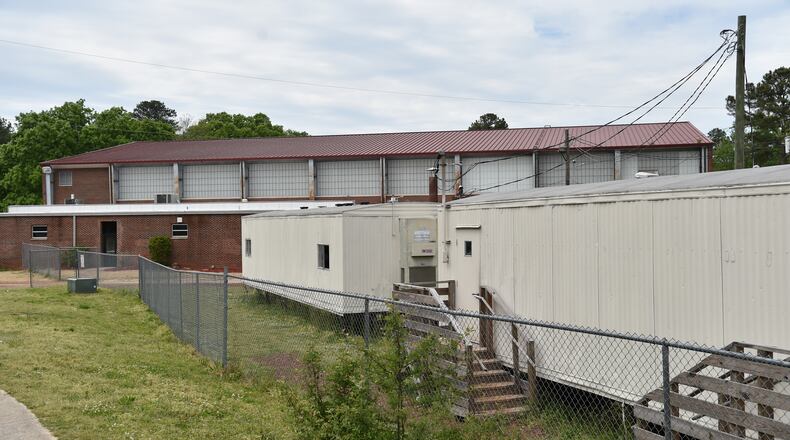Allyson Gevertz was a school psychologist in Gwinnett County Public Schools before becoming the parent of children in DeKalb County public schools. She is now an education advocate in DeKalb.
In this piece, Gevertz explains why the DeKalb school board ought to endorse the project list for the renewed penny sales tax for schools that county voters resoundingly approved in May. The board vote is scheduled for Monday.
By Allyson Gevertz
Schoolchildren and school buildings are waiting for the bell to ring to start capital improvements in DeKalb County School District.
On Monday, the DeKalb Board of Education will be asked to approve the Education-Special Purpose Local Option Sales Tax V (E-SPLOST V) project list, determining how $500 million in tax dollars will be spent. In May, DeKalb County residents voted overwhelmingly (71 percent voted ‘yes’) to continue paying a special purpose one-cent sales tax dedicated to school improvements.
A list of specific improvement projects awaits approval by the DeKalb school board. There are six reasons the board should endorse this list devised by Superintendent R. Stephen Green and his leadership team.
1) Superintendent Green has earned our trust. DeKalb voters overwhelmingly approved the sales tax without a detailed project list in advance. Superintendent Green shared spending categories before the vote, but asked for more time, data, and community input before listing specific projects. Voters witnessed DeKalb's new superintendent demonstrate an unprecedented level of transparency, as well as a straightforward style and unequivocal desire to put student needs first. This led stakeholders to trust Superintendent Green’s judgement and give him a well-deserved vote of confidence.
2) The list addresses needs, not wants. Under the old model of determining E-SPLOST funding priorities, school board members looked at their own districts and advocated for projects based on geography. Today, the district faces more than $2 billion in capital needs, partly because the old model led to unwise E-SPLOST spending. Now, money will follow need. The district has made it clear spending won’t be equally divided by region. Instead, several projects will be concentrated in Region 1 (Dunwoody, Chamblee, Cross Keys) due to extreme overcrowding.
3) The project list is based on superior data and unprecedented community input. Development of an objective project list began long before the E-SPLOST V referendum. As early as summer 2015, engineers visited local schools to assess conditions. In the fall of 2015, local school council teams toured schools with consultants. In October of 2015, Building SPACES meetings were held in each region, gathering input on building needs. From March-September of 2016, the district conducted a secondary school study to collect ideas on addressing severe overcrowding. Public input and regional steering committee meetings, as well as community surveys, provided further information for the district. This fall, additional community input sessions/surveys gauged stakeholder priorities for building renovations, HVAC improvements, security upgrades, buses, and technology. In total, district staff spent at least 18 months studying capacity, student population projections, facility assessments, feedback from 20-plus public meetings, school council letters, steering committee input, community survey results, and ideas from dozens of parent groups. The school district has enough information to create a project list based on real needs.
4) The project list is not set in stone. Because a detailed project list was not explicitly part of the E-SPLOST V vote, the proposed list can be modified (though the overall funding categories cannot). This gives Superintendent Green and his team greater problem-solving flexibility. The district will monitor system needs, student move assumptions, and enrollment projections, as well as work with local governments and communities to study traffic and land use issues. If needs change, Superintendent Green can ask the Board of Education to vote on project list adjustments. Certain modifications can be made at the local school level. For example, to help with cost estimates, drafts of building addition designs were completed, but the actual design work will take place with local school construction committees. Communities will shape the realization of the plans at their schools.
5) This is not redistricting. The term redistricting stirs controversy in some neighborhoods. The district has been transparent through the entire E-SPLOST V process, openly stating that this improvement plan is not redistricting. Any redistricting will be a separate process, involving public hearings, beginning at least one year before new schools/additions open.
6) Citizens can influence the 2022 projections and funding needs. DeKalb County has been in the news lately because its sewer system can’t handle the demands of new construction projects. Likewise, DeKalb’s school district cannot handle the demands of new construction projects – the district is challenged when single-family homes are bulldozed to make way for 200-unit apartment complexes full of school-aged children. County commissioners and city councils don’t always hold zoning/planning employees accountable for including the school district in development plans. If DeKalb citizens demand county and city leaders work with the district to help schools keep pace with growth, it could have a major impact on E-SPLOST V spending plans. With smart, collaborative development, the 2022 projections might be adjusted downward and projects scaled back.
Though beneficial, the E-SPLOST V project list will not meet the needs of every school – in fact, it won’t come close. Every school in DeKalb County needs capital improvements (playgrounds, kitchen equipment, HVAC, technology, etc.). Though E-SPLOST V funding won’t address every need, the district developed the project list in a transparent, systematic, objective way. Stakeholders clearly understand how and why certain projects are priorities.
The school board should pass the school district’s much-needed project plan on Monday, then turn its attention to other pressing matters like budgeting and curriculum development. With quick approval, the district operations staff can fast-track the most pressing E-SPLOST V priorities. DeKalb citizens should encourage the school board to move forward on the project vote without delay.
About the Author
Keep Reading
The Latest
Featured



